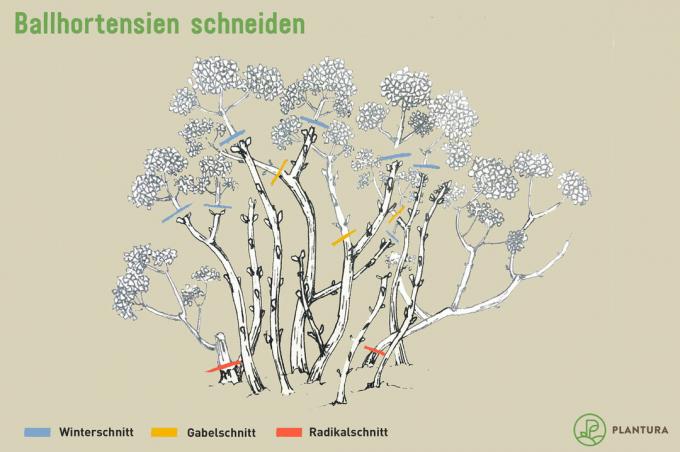Everything you need to know about pruning hydrangeas: the best time to prune and instructions for different types of hydrangea.

The right pruning is essential for magnificent hydrangea flowers. However, the different ones differ Hydrangea Species in which cut is the right one at which point in time. While some species – such as panicle hydrangeas (Hydrangea paniculata) or viburnum hydrangeas (Hydrangea arborescents) uncomplicatedly flaunting their abundance of flowers year after year can be found in the classic and widespread peasant hydrangeas (Hydrangea macrophylla) never flowered for a year. This can often be prevented, especially with the right cut.
contents
-
Pruning hydrangeas: the right time
- Prune hydrangeas in the fall
- Prune hydrangeas in spring
-
Instructions: Cut different types of hydrangeas correctly
- Pruning farm hydrangeas correctly
- Pruning viburnum and panicle hydrangeas correctly
- Pruning climbing hydrangeas correctly
For correct pruning of hydrangeas (Hydrangea) you first need to know which species have taken root in your home garden. Because peasant hydrangeas (Hydrangea macrophylla) and Oakleaf Hydrangeas (Hydrangea quercifolia) develop their flowers for the following year already in autumn. So they bloom on the previous year's wood. If you cut back too much here, it can mean the loss of the beautiful flowers. Panicle (Hydrangea paniculata) or viburnum hydrangeas (Hydrangea arborescents), on the other hand, bloom on so-called one-year-old wood - that is, they form their flowers in the same year in which they bloom. So these two popular hydrangeas are among the species that can be pruned back without hesitation.
Pruning hydrangeas: the right time
Hydrangeas can be pruned either in autumn or in spring before they sprout again. Both times have their advantages and disadvantages.
Prune hydrangeas in the fall
If you already cut your hydrangeas in autumn, you should consider the following points:
- Dried flowers no longer serve as a breeding ground for fungal pathogens
- If the hydrangea is not adequately protected from frost, it can penetrate more easily through the interfaces and cause damage

Prune hydrangeas in spring
The following advantages and disadvantages arise if hydrangeas are only cut in spring instead of in autumn:
- Even dried-up flowers still have a certain ornamental value in winter
- It is not so easy for the frost to damage the hydrangea
- If the hydrangea is wrapped to protect it from frost, mold can develop more quickly on the dried plant remains due to poor air circulation
Instructions: Cut different types of hydrangeas correctly
When cutting, the hydrangea species is particularly important. We look in particular at the classic farmer's hydrangea that blooms on last year's wood and the snowball and panicle hydrangeas, which can also bloom on new shoots. You will also learn what to consider when pruning climbing hydrangeas.
Pruning farm hydrangeas correctly
At the classic peasant hydrangea radical pruning should be avoided if possible. Most varieties will then not flower the next year. It is better to correct the shape with the annual pruning of some shoots. With some new varieties of Hydrangea macrophylla However, this is now obsolete, as they are remontant - this means that they can flower several times a year and also on fresh shoots.
- Cut flowers in autumn: Dried flowers should ideally be cut back in autumn, but you can also cut them back in spring. It is important to make the cut just below the inflorescence so as not to endanger the flowering in the following year.
- Cut out weak and dead branches: Together with cutting off the inflorescences, diseased and weak shoots can also be cut out. This reduces the risk of infection with fungal pathogens and creates some light inside the woody shrub.
- Remove old shoots: Older shoots, which are already heavily branched and form very strong branches at the base, should be removed when the time comes. Depending on the size and age of the hydrangea, more or fewer shoots can be cut off a few centimeters above the ground. This gives the plant more energy for new shoots and larger flowers on the younger, more vital branches.
- Avoid radical pruning

Pruning viburnum and panicle hydrangeas correctly
Hydrangeas, which can bloom on one-year-old wood, i.e. the fresh shoots, are much less complicated to cut. With one cut, faded inflorescences can be removed and the shape can be corrected. They can easily be shortened to 30 centimeters. This also promotes branching excellently. The pruning can be done either in autumn or in too frosty regions in spring before new growth.
Pruning climbing hydrangeas correctly
Actually needs one climbing hydrangea (Hydrangea petiolaris) no real pruning. However, the previous year's flowers should also be removed here. This looks nicer on the one hand and also protects against fungal attack. If the climbing hydrangea grows too much for you, it can be cut back without any problems. However, it should be noted that the flowering will probably be absent, as well Hydrangea petilolaris just like peasant hydrangea blooms on perennial wood. More information about Pruning climbing hydrangeas you'll find here.
If you want to know more about the different Hydrangea species and varieties If you want to know, you will find all the important information in this article.
